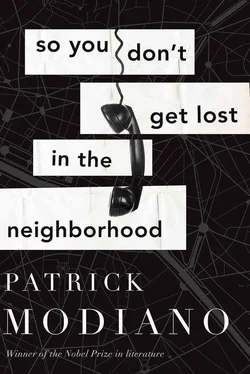“Do you want me to explain why I took you to have passport photos made?”
Daragane felt she was not embarking on this subject willingly. But dusk was closing in and, in this drawing room, the dim light could make revelations easier.
“It’s very simple. . In the absence of your parents, I wanted to take you with me to Italy. . but for that, you needed a passport. .”
In the yellow cardboard suitcase that he had humped around from room to room for some years, which contained exercise books, certificates, postcards sent to him when he was a child and the books that he was reading at that time— Arbre, mon ami, Le Cargo du mystère, Le Cheval sans tête, Les Mille et Une Nuits —there might be an old passport in his name, with the photograph, one of those navy-blue passports. But he never opened the suitcase. It was locked, and he had lost the key. Like the passport, no doubt.
“And then, I wasn’t able to take you to Italy. . I had to stay in France. . We spent a few days on the Côte d’Azur. . And afterwards, you went back home. .”
His father had come to collect him from an empty house, and they had caught the train back to Paris. What exactly had she meant by “home”? However much he racked his memory, he had not the slightest recollection of what in present-day language is known as “a home of one’s own”. The train had arrived, very early in the morning at the gare de Lyon. And after that, long, endless years of boarding school.
“When I read the passage in your book, I searched among my papers and I found the passport photos. .”
Daragane would have to wait for over forty years to learn another detail of this affair: the passport photos of an “unidentified child” that had been confiscated during a search at the customs post at Ventimiglia. “All I know about this woman,” Perrin de Lara had said to him, “is that she had been in prison.” In that case, the passport photographs and other things removed during the search when she was released from prison had certainly been returned to her. But sitting beside her there, on this sofa, Daragane did not yet know these details. We discover, often too late to talk to them about it, an episode from their life that a loved one has concealed from you. Has he really hidden it from you? He has forgotten, or more likely, over time, he no longer thinks about it. Or, quite simply, he can’t find the words.
“It’s a pity we weren’t able to go to Italy,” said Daragane with a big smile.
He sensed that she wanted to tell him something in confidence. But she shook her head gently, as though she were dismissing bad thoughts — or bad memories.
“So, you live in square du Graisivaudan?”
“Not really anymore. I found a room to let in another neighbourhood.”
The owner was not in Paris and so he had kept the key to the square du Graisivaudan room. So, he did go there illegally sometimes. The prospect of taking refuge in two different places put his mind at ease.
“Yes, a room near place Blanche. .”
“At Blanche?”
This word seemed to conjure up a terrain that was familiar to her.
“Will you take me to your room one day?”
It was almost dark, and she switched on the standard lamp. They were both sitting in the middle of a halo of light, and the drawing room remained in the shade.
“I knew the place Blanche area well. . Do you remember my brother Pierre? He had a garage over there.”
A young man with dark hair. At Saint-Leu-la-Forêt, he sometimes slept in the small bedroom, on the left, at the end of the corridor, the one with the window that gave onto the courtyard and the well. Daragane remembered his sheepskin jacket and his car, a Renault 4. One Sunday, this brother of Annie’s — after all this time, he had forgotten his first name — had taken him to the Cirque Médrano. Afterwards, they had driven back in the Renault 4 to Saint-Leu-la-Forêt.
“I haven’t seen Pierre since I’ve been living here. .”
“Strange sort of place,” said Daragane.
And he looked around at the bay window — a large black screen behind which the leaves of the trees could no longer be seen.
“We’re in the back of beyond here, Jean dear. Don’t you think?”
He had been surprised earlier by the silence of the street and by the railings that created a dead end to the road. When night fell, you could imagine the building being on the edge of a forest.
“It’s Roger Vincent who’s rented this house since the war. . It had been impounded. . It belonged to people who must have left France. . With Roger Vincent, you know, things are always a bit complicated. .”
She called him “Roger Vincent”, and never simply “Roger”. Daragane, too, as a child, used to greet him with a “Good morning, Roger Vincent”.
“I’m not going to be able to stay here. . They’re going to let the house to an embassy, or knock it down. . At night, sometimes, I’m frightened of finding myself all alone here. . The ground floor and the second floor are unoccupied. . And Roger Vincent is hardly ever there.”
She preferred to talk to him about the present, and Daragane understood this very well. He wondered whether this woman was the same person whom he had known, as a child, at Saint-Leu-la-Forêt. And as for himself, who was he? Forty years later, when the enlargement of the passport photograph would fall into his hands, he would no longer even know whether that child was himself.
Later on, she had wanted to take him to have dinner, close to where she lived, and they had ended up in a brasserie on Chaussée de la Muette. They were sitting, opposite one another, at the very back of the restaurant.
“I remember that we sometimes used to go together to the restaurant, at Saint-Leu-la-Forêt,” Daragane said to her.
“Are you sure?”
“The restaurant was called Chalet de l’Ermitage.”
This name had struck him as a child because it was the same as that of the street.
She shrugged.
“I’m amazed. . I would never have taken a child to a restaurant. .”
She had said this in a stern voice that surprised Daragane.
“Did you stay much longer in the house at Saint-Leu-la-Forêt?”
“No. . Roger Vincent sold it. . That house belonged to Roger Vincent, you know.”
He had always believed that it was Annie Astrand’s house. At the time, these two names seemed to him to be linked: Anniastrand.
“I spent about a year there, didn’t I?”
He had asked the question that was on the tip of his tongue, as though he were afraid it might not be answered.
“Yes. . one year. . I’m not sure. . your mother wanted you to have some country air. . I had the impression that she was trying to get rid of you. .”
“How did you come to know her?”
“Oh. . through friends. . I used to meet so many people in those days. .”
Daragane realised that she was not going to tell him much about that time at Saint-Leu-la-Forêt. He would have to be satisfied with his own memories, memories that were sparse and few and which he was no longer even sure were accurate, since she had just told him that she would never have taken a child to a restaurant.
“Forgive me, Jean dear. . I hardly ever think of the past. .” She paused for a moment, and then:
“I had some difficulties at the time. . I don’t know whether you remember Colette?”
This name awoke a very vague recollection in him, as elusive as a reflection that flickers all too briefly on a wall.
“Colette. . Colette Laurent. . There was a portrait of her in my bedroom, at Saint-Leu-la-Forêt. . she used to pose for artists. . She was a friend from teenage days. .”
He clearly remembered the painting between the two windows. A girl with her elbows on a table, her chin in the palm of her hand.
Читать дальше












